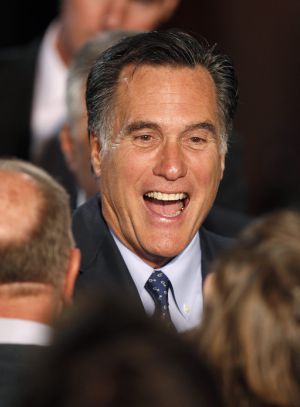
Following his victory in the Texas primaries, Mitt Romney is mathematically assured the number of delegates required to be named the Republican presidential candidate at the August convention, and is therefore officially Barack Obama’s rival. This process was achieved at the best moment of his candidacy — with his competitive positioning in [public opinion] surveys and with the party much more united around him than what was anticipated a few weeks ago.
In some way, Romney has already made history in becoming the first Mormon to reach this phase of a presidential career. It is not his religion that, at the moment, occupies the electoral debate, but it could surely be a relevant factor when Catholic and Evangelical voters, who question the Mormon faith, have to decide whom to vote for.
The Romney campaign was born in the conditions of a hard electoral battle — [conditions due] not so much to the qualities of the Republican candidate but rather to the obstacles Obama faces in his bid for re-election, principally, an economy that has not recovered in the proportion necessary to ward off unemployment concerns and uncertainty about the future. Yesterday, data was released on the percentage of North Americans in their most productive ages, between 25 and 55 years, who have jobs: it was the lowest of the last quarter century.
His victory in the primaries — his already surpassing the 1,144 delegate number needed for the nomination — does not eliminate in entirety all of the doubts that Romney’s candidacy has generated from the beginning. The suspicions over his lack of principles and the controversy over his past as entrepreneur fully remain. But, five months before the November election, there has been a new sense that the possibilities of the right have increased.
To begin with, after the tough battle of the primaries, the Republican Party has unified at an impressive speed. The victory of Romney in Texas, for example, is partly because of the support received by the governor of the state, Rick Perry, who was one of [Romney’s] toughest rivals during the caucus days in Iowa and the primaries of New Hampshire. “He’s a better candidate today than he was four years ago and four months ago,” Perry now says.
This Wednesday, support was also offered by ex-Secretary of State Condoleezza Rice, who is now a professor at Stanford University. In the 2008 election, Rice did not openly call for the vote for Republican Senator John McCain, who lost to Obama.
With the political support comes the financial support. On Tuesday, Romney was in Las Vegas with the casino mogul Sheldon Adelson, the same man who promotes investments in Spain and who in the past has financially sustained Newt Gingrich. American Crossroads, the political action committee led by Karl Rove, a former adviser to George W. Bush, has started a campaign of support for Romney, which, in reality, consists of an attack on Obama for his supposed hostility to private enterprise. Where Rove goes, the conservative establishment follows.
The unity around Romney is, in great measure, unity against Obama. In a recent Fox network survey, 43 percent of those interviewed mentioned as a principal quality of the Republican candidate, “he is not Obama.” Around 8 percent mentioned his proposals about the economy and unemployment.
But in the cause against Obama, some dangerous individuals are getting ready as well. Romney’s leadership on his day of triumph has been stolen by the millionaire Donald Trump, who captured the main minutes of television news with his insistence that Obama was born in Kenya and, therefore, his presence in the White House is illegal. Romney’s campaign tried to separate itself as far as possible from this accusation, but the Democratic rivals demanded a public disavowal of Trump, which did not occur.
This is going to be part of Romney’s problem in the coming months. He has his party with him, but that does not mean that he is the leader of the party. His authority is very fragile, purely circumstantial, and is constructed on the basis of his getting along with every member of the conservative family, including Trump and the tea party.
In these conditions, it is not going to be easy to construct a personal profile. Romney still has a serious credibility deficit. He is not even known well, or what is known about him is not very clear. The trust of the citizens in Romney has improved lately, but only to 42 percent, 11 points inferior to Obama’s number, according to Real Clear Politics.
Romney is forced to tiptoe around his years as governor of Massachusetts, where he adopted, to win, progressive positions, like support for homosexual rights, that now disturb him and that he now regrets. He is also not very comfortable in defending his work as an entrepreneur, a phase of light and darkness that links him to a very controversial sector of the economy, that of buying and selling bankrupt companies.
His objective is for the debate to center on the present economy and his ability to improve it. He has promised that unemployment, now around 8.1 percent, will fall to 6 percent in his first year as president.

Leave a Reply
You must be logged in to post a comment.